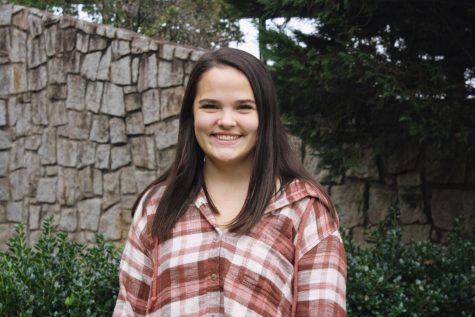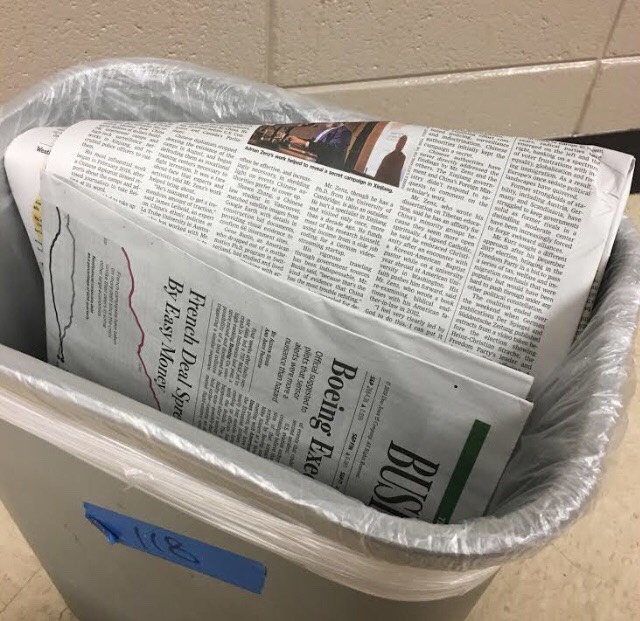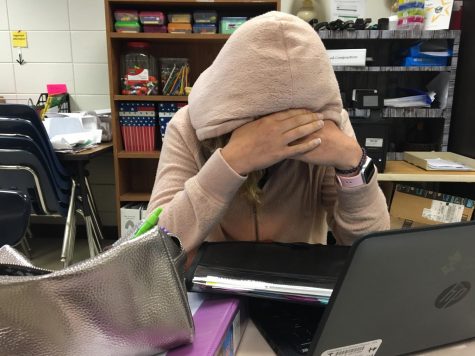Fake news
Warning: this could be fake news
Wild stories filled with inaccurate information seem to be popping up everywhere. Where do people hear these stories? Many point to the same place: social media.
The majority of the American population is hearing stories from social media, which opens a gateway of possibility for fake news to constantly bombard the American population. Other news sites are not any more reliable than social media.
“The Fake News media is officially out of control. They will do or say anything in order to get attention–never been a time like this,” President Donald Trump tweeted (@realDonaldTrump) on May 4, 2017.
There is often controversy over whether CNN or Fox News is a better news source. Many people believe that CNN is liberal-based, and Fox News is conservative-based. Many Twitter users have been using the hashtag #CNNFakeNews, while others have been calling out Fox for its bias. In the end, it boils down to which sites use the most accurate and balanced information. Usually, students choose to watch the news sites from the side tend to favor.
“I watch Fox News because it is usually more balanced and related to my view well,” Walt Centers, sophomore, said.
In the instance of the Covington Catholic incident when teenagers in “Make America Great Again” hats were accused of blocking a group of Native Americans from continuing their march, some news sources only covered the side of the Native Americans who claimed the high schoolers circled them. Others show the side that the high schoolers were allegedly circled by the natives who staged the incident.
“In fact, it’s quite the common thing. In this increasingly depraved society, that kind of behavior is often encouraged or excused as just good ol’ American fun,” Simon Moya-Smith, CNN author, said in her article America mocks and dehumanizes natives at every turn.
Another example of fake news was when actor Jussie Smollett allegedly staged a hate crime by hiring people to attack him. Many media sites reported this when Smollett first came out with his story, not waiting to find all the facts. Other media sources kept the story accurate by using the word “alleged” until the facts were set straight.
“But as Smollett’s profile grew in the wake of the attack, evidence emerged suggesting the actor had orchestrated the attack himself, allegedly in an effort to raise his profile and secure a higher salary,” Louis Nelson, author for Politico, said in his article Trump promises federal probe into Jussie Smollet case.
The risks of fake news are high. An uneducated population means there are ignorant voters. Without the factual stability of news and the dying business of printed newspapers, and the convenience social media provides, it is difficult to avoid getting daily news from unreliable sources.
“I mostly have friends that can vote, but mostly they know what they’re talking about, but sometimes they don’t,” Sebastian Piatt, senior, said.
There are many ways to find accurate news sources, but it is difficult for the majority of people. Both sides of the political spectrum want real news.
Two truths and a lie
When someone sees a fact on social media that does not support their opinions, they may immediately say it is false information. The question is whether or not their accusation is accurate.. Different sources give different statistics, different opinions, and present different sides of the stories. A few examples of fake news have made it to national headlines. However, many fake news stories are virtually unrecognizable. In fact, people read fake news often without knowing it.
“I have [seen facts on social media that did not seem accurate]. Not everything said in social media is true, and sometimes it is just people seeking attention,” Ivy McKinney, freshman, said.
On social media, many of facts and news stories are spread around without a reliable source behind them. These often get reposted and retweeted rapidly. This is part of why people say not to trust everything on the internet.
Other times, people will post fake news stories sarcastically as a joke. It is tough for others to know that people are joking, and this leads to controversy. Some examples of sites that do this include Onion and Clickhole.
Other media sites are often called out for not being reliable. President Trump iconically accuses CNN of being “fake news.” Liberals typically call out other conservative-based sites for false or fake reports.
“Yet the relationship between Donald Trump and Fox News is distinctly different, bringing the channel closer to state television than anything the United States has ever known,” a CNN article, “Why the Trump-Fox News relationship really is unprecedented” by Nicole Hemmer said.
With so much chaos over news, it is difficult to determine what is fake and what is not.
True or false
If fake news really is so common, how do people know what to trust? Imagine a world where there was no access to accurate facts. That is the route America could be headed down if media sites continue with this trend of unreliability.
“‘Fake news’ was not a term many people used four years ago, but it is now seen as one of the greatest threats to democracy, free debate and the Western order,” James Carson said in his article on The Telegraph, Fake news: What exactly is it- and how can you spot it? (hyperlink to https://www.telegraph.co.uk/technology/0/fake-news-exactly-has-really-had-influence/)
If no one can tell what is real or not, it is difficult to construct opinions. Many people are uneducated. This can affect votes and lead to uneducated decisions.
“[I feel very] uneducated. There are so many candidates and elections,” Brazill Kaleem,Etowah senior, said.
Media sites are becoming less reliable because there are not as many, and the existing ones are becoming more and more politically based. There is less competition, which lowers the need for newspapers to be as factual. Another problem is that newspapers becoming extinct. Almost everyone gets news from online sources, which opens the door for more room for fake information to come in the way.
Although the consequences of fake news are serious, there are many ways to guard against it. Before spreading information, people should check other sources to see if they point to other similar facts. Also, people can learn not to rely on media sites to give them completely accurate facts.
“If you notice a glaring lack of quotes and contributing sources, particularly on a complex issue, then something is amiss. Credible journalism is fed by fact-gathering, so a lack of research likely means a lack of fact-based information,” Christina Nagler said in the Harvard Summer School article, 4 Tips for Spotting a Fake News Story. (hyperlink to https://www.summer.harvard.edu/inside-summer/4-tips-spotting-fake-news-story)
Fake news has spiraled into a major problem, but it is not one that cannot be solved. It is important to remember to look at all the facts before jumping on the bandwagon.

Hey! I’m Nicole. I’m the head of staff and an editor. Last year I was an exchange student in Spain, so you’ll notice a lot of my articles are about...






